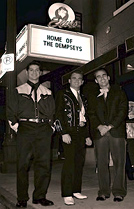




 |
 |
 |

Comment
on this story
What:
The Dempseys
When:
Thursday, July 15, 10 p.m.
Where:
Barley’s Taproom & Pizzeria
Cost:
$6
|
Rockabilly Will Never Die
Fans say they should be stars; the Dempseys just want to play
by John Sewell
As the old adage goes, rock ’n’ roll will never die. And—to go a step further—each and every subgenre of rock ’n’ roll will never die. Be it new wave, neo-new wave, no wave, neo-no wave, hardcore, heavy metal, ‘the new wave of heavy metal’ (a British designation foisted on Def Leppard, Girl et al ‘round 1979), death metal, grindcore, emo, rap rock, country rock, Britpop (which is also produced here in the States, after a fashion) ska/punk, pop-punk, streetpunk, ‘swing’ (Anybody remember Big Bad Voodoo Daddy?), skatepunk, oi!, stoner rock, redneck rock, gearhead rock... Sheesh. For every niche, there is a pocket of people, somewhere, churning out the stuff forever and ever ad infinitum.
An early predecessor to modern rock, rockabilly is the oft misunderstood missing link between rock and country—a wild sound produced by even wilder hillbillies, ‘the devil’s music,’ sin incarnate. These days rockabilly has become the domain of tattooed, thirty-something former punks. Any rockabilly event is a fashion show of Betty Page wannabes, tattooed, pompadoured love boys, Tank Girl dopplegangers and the like. And in many cases, creating an anachronism of fashion seems to take precedence over making good music.
“Well, a lot of the dress just sort of goes along with the music we play,” says Brad Birkendahl, guitarist/vocalist for The Dempseys, a truly rockin’ rockabilly band from Memphis via Tacoma, Washington. “We just think it [dressing in rockabilly regalia] is a cool look. I don’t think it’s really essential; but for us, it’s a necessity. It kind of gives us a unified look and that’s really sharp.”
Genre-specific fashion or no, The Dempseys are by no means Johnny-come-latelys to the rockabilly sound. Adept musicians, the band creates music that is simultaneously true to its roots and modern. A quick listen to the trio reveals influences from all over the palate of American popular music: jazz, soul, and country as well as the obvious antecedents.
“I think we know the roots stuff really well,” enthuses Birkendahl. “We know where we’re coming from, but we give it a modern flavor. Lots of people tell us that they really don’t like rockabilly, but that they like what we’re doing.”
The Dempseys must be doing something right. A self-sustaining unit for seven years, the band uses its Memphis homebase as a jumping off point for touring, mostly in the South. The move from Tacoma to Memphis has proven beneficial to the band, allowing them to trace the footsteps of their Sun Studio heroes while creating their own scene. Birkendahl says there wasn’t much of a rockabilly scene in Memphis when they arrived.
The band is currently making their foray into the movies, appearing as Elvis’ backup band in an upcoming 20th Century Fox film about Johnny Cash’s life. “The movie people came here to make the film and Roland James [a musician from Jerry Lee Lewis’ band] suggested they use us,” says Birkendahl. “And that’s especially fun for me because I’ve always been a huge Elvis fan.”
Playing in The Dempseys has practically been a lifelong quest for all three of the members. They met in middle school and started a band by their early teens.
“I grew up as a huge Elvis fan and I always wanted to play music like his,” says Birkendahl. “My parents had lots of records by Elvis, Gene Vincent, Eddie Cochran, all those guys.
“So when we started playing, I already had my roots. I showed our bass player some old videos, and he thought it would be cool to slap that double bass. And the drummer already had roots in jazz: that gives our music its swing. Rockabilly is an old, lost art form that was almost new to us when we were first playing in the garage.”
The Dempseys’ upcoming show at Barleys is almost like a homecoming for the band. “We’ve played there six or seven times,” says Birkendahl. “We always get good crowds—knock on wood—and they dance and just eat it up. Knoxville is always one of our favorite gigs.”
The band is doing just fine on its own, and has no plans for following the usual, body-strewn path of music industry crash and burn. “People come up to us all the time and say I can’t believe you guys are not stars,” says Birkendahl, seeming wary but confident. “That happens all the time. And I tell them we’re not really looking to be stars. No one has made us any offers and we’re not knocking on any doors, either.”

July 15, 2004 • Vol. 14, No. 29
© 2004 Metro Pulse
|
|